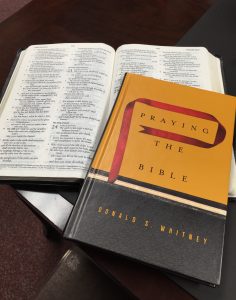I have identified a problem. My prayer life is boring! I pray the same old things about the same old things. Constant repetition leads to boredom. Boredom leads to apathy. Apathy leads to disengagement. I am an unengaged prayer. How did this happen? I am a pastor. I study the Word of God regularly. I attend church. I practice spiritual disciplines.
By all considerations, it would seem that my prayer life would be strong, that my prayers would carry power, that my communion with God in prayer would be intimate. Yet, I find myself praying the same old things about the same old things, and it is a problem.
I became acutely aware of this problem last year. I was attending a seminar on spiritual development when the professor shared with us that we would spend three hours in prayer and solitude. THREE HOURS! What would I do for three hours?
As the time of solitude began, I quickly realized my prayer life was not up to par for such a significant time of communion with God. In previous years, I had been taught a model of prayer built upon an acrostic of the word A.C.T.S. (Adoration, Confession, Thanksgiving, and Supplication). I began praying and moved through these four points of prayer. I assumed that I had at least used 15 minutes or so of the three hours designated.
When I checked my watch, I was astonished to realize I had only been praying for three to four minutes! If you are like me, you find yourself battling to engage in meaningful, intimate prayer. Your mind wanders when you pray. You run out of things to say. Your prayers are more about you than anything else. You say the same old things about the same old things. Through these struggles, you end up forsaking prayer instead of engaging it. This leads you to the decision that something is wrong with you.
Donald Whitney, professor of biblical spirituality and associate dean at the Southern Baptist Theological Seminary in Louisville, Ky., suggests otherwise. “No, the problem is almost certainly not you; it’s your method. If you have turned from living for yourself and your sin and have trusted Jesus Christ and his work to make you right with God, God has given you the Holy Spirit. And if you are seeking to live under the lordship of Jesus Christ and the authority of God’s Word (the Bible), confessing known sin and fighting lifelong tendency to sin instead of excusing it, then the problem of boredom in prayer is not you; rather, it is your method.” (pg. 15)
So how do you change your method to create a more powerful prayer life? I would like to recommend a powerful, little book that has revolutionized my prayer life — Praying the Bible by Donald S. Whitney.
Whitney recommends a solution to this prayer problem, “when you pray, pray through a passage of Scripture, particularly a psalm.” (pg. 27) Whitney urges the reader to consider the ramifications of praying scripture back to God. His outline is simple, read a verse, stop and pray that verse back to God. When you have nothing left to pray on that verse, move to the next one. That is it. It is that simple.
This small but powerful book has intensified my personal time with the Lord. My prayers are more effective, fervent, and God-centered. I no longer run out of things to pray. I am less distracted than ever before. Praying Scripture works! Whitney finally observes, and is right, “Anyone with a Bible and the Holy Spirit has everything necessary to enjoy God in prayer and to banish the boredom born of repeating tired phrases about the same old things.” (pg. 76) The pages of Whitney’s work will help you to stop saying the same old things about the same old things and create in you a passionate, powerful, posture of prayer.
